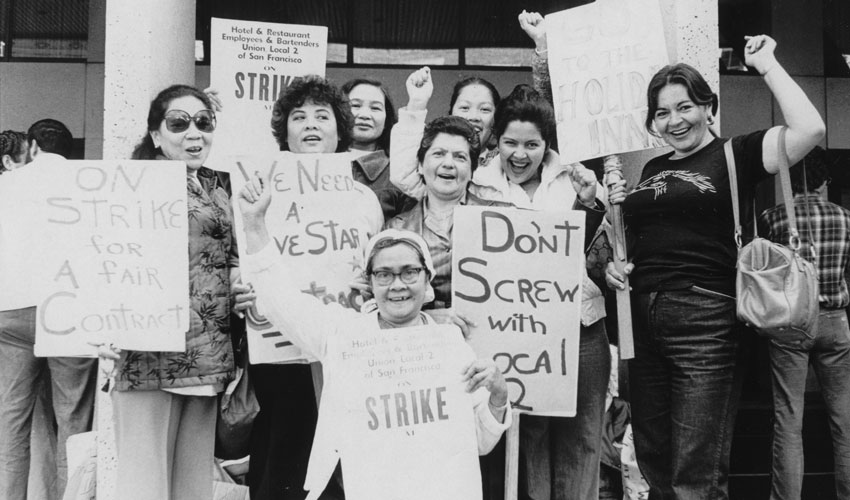Labor Archives and Research Center marks 30 years, looks to future

This photo of workers during a 1980 hotel strike is one of more than 7 million items in SF State's Labor Archives and Research Center, which is celebrating its 30th anniversary this year.
For three decades, San Francisco State University's Labor Archives and Research Center has built an impressive collection of materials documenting the history of the Bay Area labor movement. Now, as it marks its 30th anniversary, the center's next step is making sure even more people have access to all of it.
The center features more than 7 million documents – enough primary source material to fill 3,200 boxes -- including photos, oral histories, pamphlets and manuscript collections. Director Catherine Powell says a key objective over the next 10 years is to digitize as much of this material as possible, making it more readily available to anyone interested in this important part of local history.
"It's a history that is not often known, and part of our goal is to help people understand the people who built this city and keep it running," said Powell.
The center will also acknowledge its own history on May 3 with a unique performance to mark its 30th anniversary. Members of Flyaway Productions, an aerial dance troupe, will perform on the side of the J. Paul Leonard Library – the center's permanent home since 2012. The performance will celebrate working women who have broken through gender barriers in non-traditional work. In addition to the performance, the School of Theatre and Dance will hold a master class with Flyaway's choreographer, Jo Kreiter, and an evening program will feature a lecture by Stanford University historian Myra Strober.
The Labor Archives and Research Center was created through a collective effort between faculty members at SF State and the labor community, Powell said, and is heavily utilized by University classes. The center also holds an annual event featuring labor historians and organizations active in the community today — part of its effort to connect history to the present.
"The city's changing rapidly, and part of understanding the city that San Francisco is now is understanding the history of labor," she said. "San Francisco has always been a union town."
With nearly all of the oral histories already digitized and online, Powell said the goal is not to merely take "hard copy" collections and create digital versions, but to package the information in a way that is coherent and useful. She is working with other organizations, such as SF State's Bay Area Television Archive, to provide a broad mix of different types of material on the same historical moment so researchers can get a full picture of past events.
"We're a unique resource and we have a wide array of material that looks at people and their struggle for economic justice," Powell said. "This is an important part of the story of San Francisco."
For more information about the 30th anniversary event, visit the Labor Archives and Research Center's website at library.sfsu.edu/larc